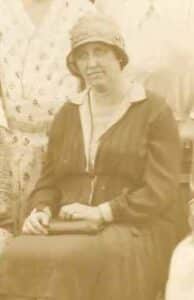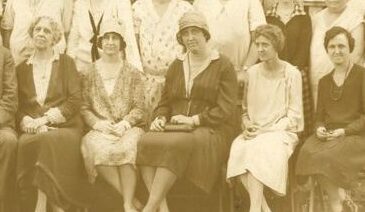Concerned for the spiritual needs of Columbia’s mill workers and their families, Emily Dick (third from right) attended Moody Bible Institute in 1913 to better learn the Bible. Five years later she arrived back in Columbia, SC, where she and her circle of six praying ladies saw their dream manifest, officially becoming Columbia Bible School in 1923. Columbia Bible College (now Columbia International University) praying ladies, left to right: Mrs. T. Hal Dick (Emily’s mother), Elizabeth Tarrant, Emily Dick, Margaret Childs & Mary Dibble (not pictured Pamela Moore and Mrs. Pearl Stone). These played key roles in the founding of CBC. Photo courtesy CIU Alumni Relations/Pinterest.
Against a backdrop of war and political strife, Emily Dick taught Sunday School to the children of the mill villages in Columbia, SC. Her calling was not the political picket lines in front of the White House, or the smoke and cinder of the battlefields, or even as a Red Cross nurse. Her passion was for the poor and desperate young ones that ran the streets in her own town. Her battlefield was the shotgun houses and byways around the Palmetto Cotton mill and the Whaley mill village.
Greta Clinton, Strategic Projects Manager of Alumni & Advancement at Columbia International University, beams with pride as she tells the story that is rooted in the institution’s founding. She energetically finds several books that retell the CIU story and proudly points out that the school is in their centennial celebration. The “Six Praying Ladies”, led by Emily Dick, are the first touchstones of their continuing mission and are catalogued in the “Celebrating 75 years of God’s Faithfulness” published by the University.

Miss Emily Dick
The United States and the city of Columbia were going through some formative changes between 1910 and 1922. The army was mobilized to deal with problems at the Mexican border and, then later, for war in Europe. Contracts went out to the factories and men signed up for war, while the Red Cross enlisted thousands of volunteers across the country. In Columbia, Camp Jackson was created to train the young soldiers heading out to the horrors of trench warfare.
The women of the country, too, continued their efforts to obtain the right to vote. For fifty years they had picketed, marched and been arrested. Their fight on a State level was a longer struggle, but political muscle among the ladies helped to ratify the nineteenth amendment nationally in 1919.
For Emily, and her young friends, the work of simple encouragement and prayer was their fight. While the wars and political chaos came and went through the years, their work paid dividends that would be felt a hundred years later. They organized local Bible studies. They led sewing, cooking and recreation classes to help meet the needs of the families working in the textile mills. They did the hard work of loving on their neighbors.
The textile villages were a melting pot of the poor from across the south. The workers had left the hardscrabble farms for a promise of better wages and work. The villages took on a life of their own as the mill owners provided schools, health care and recreation to the workers who signed on. As such, they were set apart from the rest of the city’s citizens and had a rough reputation that extended for generations.
Jake Jaco, whose family established an iconic business at the corner of Rosewood and Bluff Road in the early 1900s, would echo that sentiment. “Most neighborhood baseball games that were played never made it past the 5th inning because inevitably a fight would break out and the game would be called off.”
Bruce Kelly grew up in the Olympia/Whaley mill village years after Miss Dicks roamed the streets, but he freely acknowledged that reputation. He would say, “Olympia had some tough people, but the people in the Palmetto Compress Mill area were meaner.”
Emily and the “Six Praying Ladies” were not dissuaded.
For the management in the mills, better quality, production and morale were natural byproducts of the investment of love and care from Emily and her crew. This was wonderful news in an industry that found itself constantly fighting labor unions and deadlines. The management sought to replicate Emily’s vision and she found herself managing her programs for the Martel Company’s southeastern chain of textile mills.
Emily would find herself in upwards of 12 mill houses in various villages and she needed more and better qualified workers to achieve her growing mission. She needed workers with Biblical training.
In the years to come, she and her band of faithful prayer warriors relied on the promises of John 15:7 that said, “If ye abide in Me, and My words abide in you, ye shall ask what ye will, and it shall be done unto you.”
They determined to start a school to train teachers to carry on the work. It would be a work that would grow with the homes and families of the villages of the textile factories.
In a tumultuous time of our country when women fought for their rights and men fought for their lives, Emily Dick immersed herself in her own fight. She dutifully, with the help of family and friends, poured out love and compassion to the residents of the nearby Palmetto and Whaley Mill villages of Columbia, South Carolina. Her compassion for the children of the “Lintheads” pointed the way to a spiritual walk of faith and blossomed into a flourishing campus of hope rooted in the Divine.

You may find our video available on Rumble. The bulk of TheStandardSC video media channel has been censored by dominant social media groups like YouTube. YouTube, owed by Alphabet (Google), removed and destroyed all of our video work without permission or remuneration. That has stopped all potential donations from our many supporters on that venue. If you want to continue to see independent thought and reports please “like”, comment, share with a friend, and donate to support The Standard on this page to assure the continued availability of news that is ignored too often by the dominant media.




 RSS - Posts
RSS - Posts